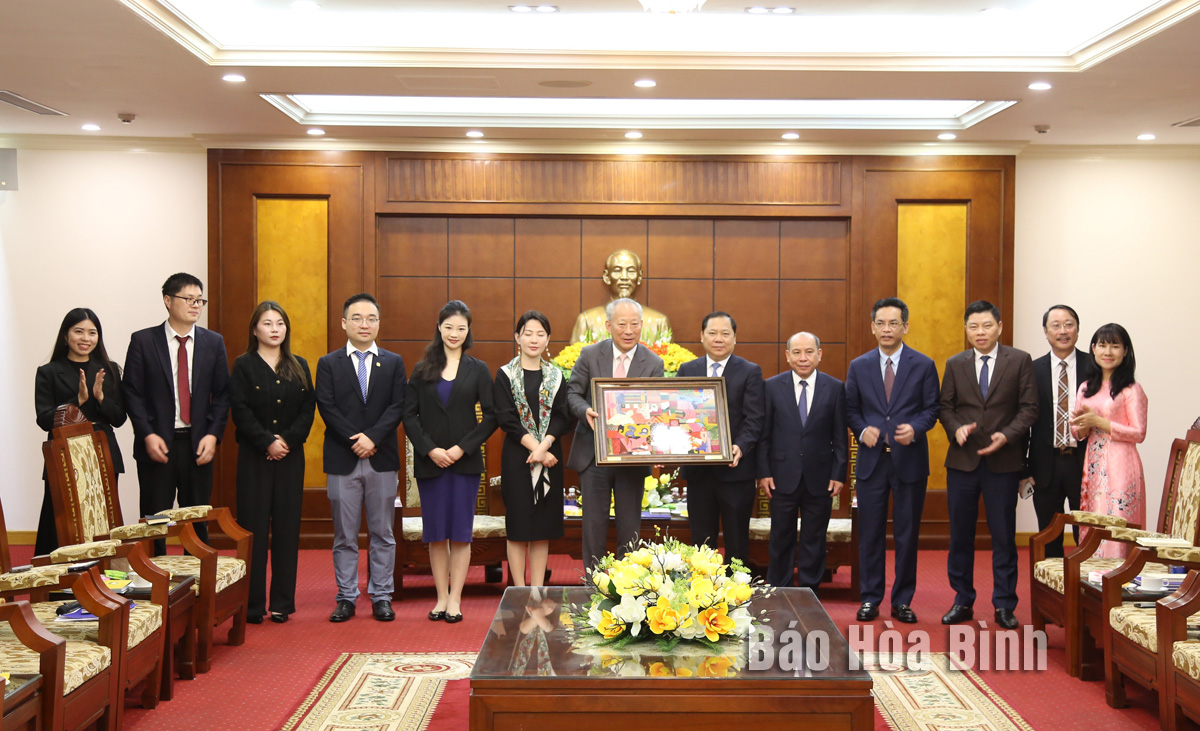
alternate member of the Central Party Committee, Secretary of the Hoa Binh provincial Party Committee Nguyen Phi Long on March 5 had a working session with Yan Jiehe, Founder and Chairman of the China Pacific Construction Group, one of China's largest private corporations in the field of transport infrastructure. Deputy Secretary of the provincial Party Committee, Chairman of the provincial People's Committee Bui Duc Hinh and leaders of provincial departments and sectors also attended the working session.

Representatives of Hoa Binh
province and the China Pacific Construction Group.
At the session, Long welcomed the Chinese group, and
thanked the group’s chairman for choosing Hoa Binh as a destination to survey
and seek cooperation opportunities.
He briefed the guests about the geographical
position, potential, and strengths of the province, emphasising that Hoa Binh
is focusing on developing four pillars - industry, agriculture, tourism
services, and urban development, along with five strategic breakthrough areas -
culture; administrative procedure reform and investment procedures;
infrastructure; digital transformation; and human resources.
In particular, Hoa Binh province is concentrating on
improving transport infrastructure, developing tourism, and infrastructure for
industrial zones and urban areas, aiming for a double-digit growth rate in
2025.
Long hoped that the Chinese group will study and
promote cooperation between the two sides. With his reputation, Yan is expected
to serve as a bridge for Chinese businesses to invest in Hoa Binh province.
For his part, Yan highly appreciated the province's
transport infrastructure and investment attraction policies. Yan affirmed that,
with his position and capacity, he is ready to work as a bridge to introduce
large Chinese enterprises to invest in Hoa Binh, especially in research and
development and transport infrastructure sectors.
He also expressed his desire to cooperate with Hoa
Binh province to implement several projects, ensuring quality, progress, and
efficiency.
Dao Village’s honey – a product certified with a 3-star OCOP (One Commune One Product) rating by Thong Nhat Agricultural Cooperative in Dao Village (Hoa Binh City) – is highly regarded by consumers for its quality, richness, and variety in packaging. The distinctively sweet taste of Dao Village’s honey leaves a lasting impression on anyone who has tried it.
In alignment with Project No. 07-DA/TU, issued by the Hoa Binh provincial Party Committee on November 1, 2021, Lac Thuy district has actively promoted investment and supported the sustainable development of its industrial and handicraft sectors during the 2021–2025 period. Alongside this, the district has remained committed to preserving and revitalising traditional craft villages.
Located in the northern part of Lac Thuy district, with a temperate climate and fertile soil, Phu Thanh commune has great potential and advantages in growing tea. The long-standing experience, combined with strict adherence to organic farming practices in the tea gardens, ensures that the dried tea products from Phu Thanh and Lac Thuy as a whole are sold out immediately upon production, providing a stable and prosperous life for the local people.
Amid efforts to streamline the administrative apparatus, Hoa Binh province has intensified measures to address challenges in land clearance, resettlement support, and infrastructure investment, aiming to speed up the progress of key projects.
Hoa Binh province has posted an unprecedented economic growth rate of 12.76% in the first quarter of 2025, marking its highest quarterly performance to date and positioning it as the second fastest-growing locality in the country, trailing only Bac Giang province.
Under current regulations, products in the One Commune – One Product (OCOP) programme that are rated three stars or higher must undergo re-evaluation every three months. However, in reality, some of these products fail to consistently meet the required standards, raising concerns about the sustainability of their OCOP certification. This underscores the urgent need for producers to enhance product quality and gradually develop their OCOP products into strong, marketable brands.



